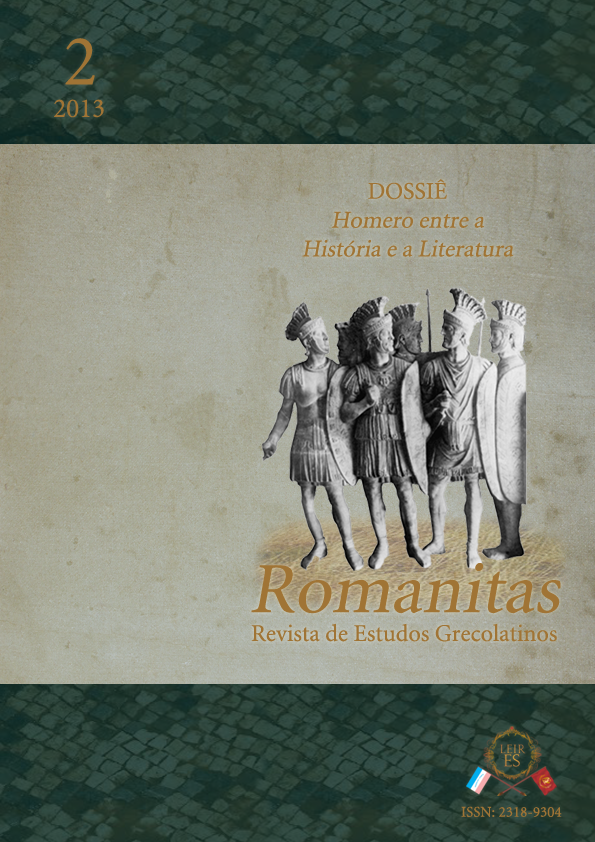Public and private in the assemblies of Ithaca
DOI:
https://doi.org/10.17648/rom.v0i2.7411Keywords:
Homer, Ithaca, Public, PrivateAbstract
Two assemblies in Ithaca are described in the Odyssey. The first is the one that summoned by Telemachus, through counsel of the goddess Athena. In it he called for the suitors to abandon their home and asked to give a boat so he could go out in search of information about his father, Odysseus. The second is the one that the relatives of the suitors gathered to call for revenge. In this article are discussed the role of these assemblies as organizational forms of society Ithaca figured in the poem. We discuss mainly as the ideas expressed by the words dēmion (public) and ídion (private) are articulate in the text and to what extent the space represented by the agora (assembly) relates to the organization models of the Greek polis.
Downloads
References
Documentação primária impressa
HOMER. Translation by A. T. Murray, revised by George E. Dimock. Cambridge: Harvard University Press, 1998.
HOMERO. Odisseia. Tradução de Jaime Bruna. São Paulo: Editora Cultrix, 1993.
TUCÍDIDES. História da Guerra do Peloponeso. Trad. Mário da Gama Kury. Brasília: Ed. da UNB, 2001.
Obras de apoio
BAILLY, A. Dictionnaire Grec-Français. Paris: Librairie Hachete, 1950.
BENVENISTE, E. O Vocabulário das instituições indo-européias – economia, parentesco e sociedade. Campinas: Editora da Unicamp, 1995. v. 1 e 2.
CHANTRAINE, P. Dictionnaire étimologique de la langue Grecque – histoire des mots. Paris. Editions Klincksieck, 1968.
DONLAN, W. Changes and shifts in the meaning of demos in the literature of the Archaic Period. La parola del Passato, v. 135, p. 381-95, 1970.
FINLEY, M. I. O mundo de Ulisses. Lisboa: Editorial Presença, 1998.
FINLEY, M. I. Grécia Primitiva: Idade do Bronze e Idade Arcaica. São Paulo: Martins Fontes, 1990.
GEDDES, A. G. Who’s who in Homeric society. The Classical Quarterly, v. XXXIV, n.1, p. 17-36, 1984.
HAMMER, D. The politics of the Iliad. The Classical Journal, v. 94, n.1, p. 1-30, 1998.
HAUBOLD, J. Homer’s people, epic poetry and social formation. Cambridge: Cambridge University Press, 2000.
HEUBECK, A; WEST, S. A comentary on Homer´s Odyssey. Oxford: Clarendon press, 1991. v. 1-3.
JULIEN, A. A interpretação das cenas de ágora na épica homérica: o texto e a determinação de seus contextos socioculturais. Fênix – Revista de História e Estudos Culturais, v. 10, ano X, n 1, 2013.
KIRK, G. S. On defining myths. In: DUNDES, A. (Org). Sacred Narrative – readings in the Theory of Myth. Berkeley: University of California Press, 1984.
LORD, A. B. Composition by theme in Homer and southslavic epos. Transactions and Proceeding of the American Philological Association, v. 82, p. 71-80, 1951.
MORRIS, I. The use and abuse of Homer. Classical Antiquity, v. 5, n.1, p. 81-113, 1986.
MOSSÉ, C. Dicionário da civilização grega. Rio de Janeiro: Jorge Zahar, 2004.
NAGY, G. Homeric Questions. Austin: University of Texas Press, 1991.
OLIVEIRA, G. J. D. A multidão diante do herói na Ilíada. 2010. Dissertação (Mestrado em História Econômica) – Programa de Pós-graduação em História Econômica da Universidade de São Paulo, São Paulo, 2010.
OSBORNE, R. Homer’s Society. In: FOWLER, R. (Ed.). The Cambridge Companion To Homer. Cidade: Cambridge University Press, 2006.
POSTLETHWAITE, N. Thersites in the Iliad. Greece and Rome, vol. XXXV, N. 2, p. 123-135, 1988.
SCHEID-TISSINIER, E. Laos et dèmos, le peuple de l’épopée. L’Antiquité Classique. Bruxelles, tome DEEL LXXXI, p. 1-26, 2002.
SNODGRASS, A. M. The Dark Age of Greece. New York: Routledge, 2000.
STUURMAN, S. The Voice of Thersites: Reflection on the origins of the idea of equality. Journal of the History of Ideas, n. 65.2, p. 171-189, 2004.
THALMANN, W. G. Thersites: comedy, scapegoats and heroic ideology in the Iliad. Transctions of the American Philological Association, v. 118, p. 1-28, 1988.
TRABULSI, J. A. D. Ensaio sobre a mobilização política na Grécia Antiga. Belo Horizonte: Ed. Da UFMG, 2001.
Downloads
Published
How to Cite
Issue
Section
License
Copyright (c) 2014 Romanitas - Revista de Estudos Grecolatinos

This work is licensed under a Creative Commons Attribution-NonCommercial-NoDerivatives 4.0 International License.
a. The authors retain copyright and grant the journal the right to first publication.
b. The authors are authorized to assume additional contracts separately, for non-exclusive distribution of the version of the work published in this journal (e.g., publishing in institutional repository or as a book chapter), with acknowledgment of authorship and initial publication in this journal.
c. Authors are allowed and encouraged to publish and distribute their work online (e.g. in institutional repositories or on their personal page) after the first publication by the journal, with due credit.
d. The journal's texts are licensed under a CC BY 4.0 Deed Attribution 4.0 International Licence (CC BY).




























